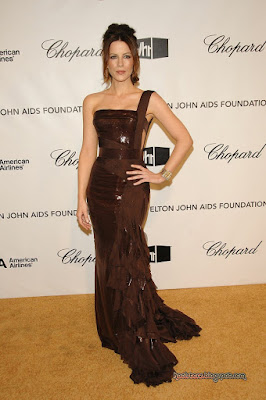
.jpg)
.jpg)
.jpg)
.jpg)
.jpg) Kate Beckinsale Profile
Kate Beckinsale ProfileName: Kate Beckinsale
Birth Name: Kate Beckinsale
Height: 5' 8''
Sex: F
Nationality: British
Birth Date: July 26, 1973
Birth Place: London, England, UK
Profession: Actress
Education: Godolphin and Latymer School in London, England
New College, Oxford University in Oxford, England (majored in French and Russian Literature; dropped out after third year)
Husband/Wife: Len Wiseman (director; met while filming Underworld; engaged on June 14, 2003; married on May 9, 2004)
Relationship: Michael Sheen (actor; born on February 5, 1969; together 1995-2003), Edmund Moriarty (dated while at Oxford)
Father: Richard Beckinsale (actor; born on July 6, 1947; married in 1977; died on March 19, 1979 of a heart attack)
Mother: Judy Loe (actress; born on March 6, 1947)
Half Sister: Samantha Beckinsale (actress; born on July 23, 1966; mother: Margaret Bradley)
Step Mother: Margaret Bradley (married in 1965; divorced in 1971)
Daughter: Lily Sheen (born on January 31, 1999; father: Michael Sheen)
Claim to fame: Feature film debut as a heroin in Kenneth Branagh's film version of Much Ado About Nothing (1993)
Kate Beckinsale BiographyKathryn Bailey Beckinsale (born 26 July 1973) is an English actress, known for her roles in the films Pearl Harbor (2001), Van Helsing (2004), and Underworld (2003).
Born in London, Beckinsale was the daughter of actors Judy Loe and Richard Beckinsale, who died from heart attack in 1979. She has a paternal half-sister, Samantha, who is also an actress. Beckinsale's paternal great-grandfather was Burmese, and Beckinsale has said that she was "very oriental-looking" as a child.
Beckinsale attended the private Godolphin and Latymer School, an all-girls independent school in London. In her teens, Beckinsale twice won the W. H. Smith Young Writers' competition — once for three short stories and once for three poems. After a rebellious adolescence, including a period of anorexia and starting a smoking habit, she followed in the footsteps of her parents and began her acting career. Her first role was in One Against the Wind, a television film about World War II that was first aired in 1991. Having gained three language A levels, Beckinsale studied French and Russian literature at New College, Oxford, though she did not finish her degree. She thought that having an academic background studying foreign language and literature would broaden her range of acting roles.
During her first year at Oxford, Beckinsale was offered a part in Kenneth Branagh's big-screen film, Much Ado About Nothing, adapted from the Shakespeare play. She spent her last year of studies in Paris, after which she decided to quit the university and concentrate on her acting career. Kate starred in a 1996 TV film adaptation of Jane Austen's Emma. She subsequently appeared in a few low-profile films, including Shooting Fish and The Last Days of Disco (both in 1998). During this time, Beckinsale also appeared in television films and in stage roles, including the well-received Cold Comfort Farm, opposite British silver and small screen notables Rufus Sewell, Eileen Atkins, Joanna Lumley and Stephen Fry.
Her first major American film, Brokedown Palace (1999), was not a commercial success. Soon after, Beckinsale was cast in the 2001 film Pearl Harbor as the female lead, after actress Charlize Theron turned down the part. The film was one of the highest grossing films of its year. In the years following, she appeared in a series of American films that were high-profile, but were given a somewhat poor critical reception, including Serendipity (2001), Underworld (2003) and Van Helsing (2004). Notably, she appeared as Ava Gardner in The Aviator, a role for which she gained 20 pounds.


.jpg)
.jpg)
.jpg)
.jpg)
.jpg)
.jpg)

.jpg)
.jpg)
.jpg)
.jpg)
.jpg)
.jpg)

.jpg)
.jpg)
.jpg)
.jpg)
.jpg)
.jpg)

.jpg)
.jpg)
.jpg)

.jpg)
.jpg)
.jpg)
.jpg)
.jpg)






.jpg)
.jpg)
.jpg)
.jpg)
.jpg)




